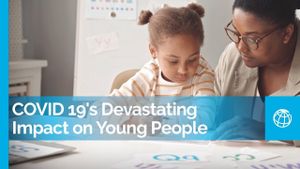Under a foggy San Francisco sky, a small but significant protest broke out last week, drawing attention to a larger controversy that has been simmering across the tech world. The subject of this outcry was the usage of artificial intelligence (AI) in hiring practices, specifically the algorithms used to screen job applicants. Protesters, holding signs that read 'Humans, Not Bots' and 'AI Can't See My Potential,' underscored the growing unease among workers about the increasing reliance on AI-driven technologies in crucial decision-making processes.
One of the protest organizers, Sarah Johnson, a software engineer who once worked with algorithm-driven hiring tools, voiced a concern that many share: 'These systems are not as objective as they seem. They encode biases present in the data they are trained on.' Her words resonated with many in the crowd, reflecting a broader anxiety about the unintended consequences of AI in the workplace.
The issue here isn't just about fairness; it's about the very future of employment. These algorithms, now used by companies worldwide, promise to streamline the hiring process by rapidly scanning thousands of resumes and identifying the most suitable candidates. Yet, despite their efficiency, critics argue that these systems often reinforce existing biases, inadvertently excluding qualified candidates based on gender, ethnicity, or socioeconomic background.
Dr. Elizabeth Hernandez, a leading AI ethics researcher, highlighted this flaw: 'Algorithms only learn from past data. If historical hiring practices were biased, the AI will likely replicate these biases.' Her research has shown that AI screening tools frequently favor candidates who fit a certain mold—typically, those who mirror the profiles of current, predominantly successful employees.
This issue of bias is not new. In 2018, a major tech company abandoned its AI hiring tool after discovering it was discriminating against female applicants. Similar stories have emerged from companies across various industries, from financial services to retail, raising essential questions about the fairness of these systems.
But there's a trade-off. Proponents argue that AI, if used correctly, can actually help demolish barriers rather than reinforce them. Dave Richardson, CEO of a tech startup that specializes in ethical AI development, believes the key lies in how these tools are built and monitored. 'Transparency and accountability are essential. We need diverse teams to develop these algorithms and continuous audits to ensure they operate fairly.'
Indeed, some companies are striving to make their AI systems more transparent. Last year, a consortium of AI developers and ethicists proposed a set of guidelines intended to mitigate bias in AI hiring tools. These guidelines urge businesses to audit their algorithms regularly, include diverse data in their training sets, and ensure that their AI systems can explain their decision-making processes.
The stakes are high. With unemployment rates fluctuating due to economic uncertainties, more job seekers find themselves at the mercy of automated hiring systems. Maria Sanchez, an experienced marketing professional, shared her frustration: 'I've applied to countless jobs, and sometimes I don't even get a rejection email. It's like my resume just disappears into some digital black hole.'
Her anecdote is all too common in today's job market. The dehumanization of the hiring process can leave candidates feeling demoralized and powerless, exacerbating the challenges they already face in a competitive environment.
Not all feedback about AI in hiring is negative. Some job seekers have found the transparency provided by certain AI tools helpful. Automated systems that offer feedback on why an application was rejected or provide tips for improvement can be invaluable. Louis Tran, a recent graduate, noted, 'One platform gave me tips on how to better tailor my resume for the industry I was targeting. That feedback helped me land my first job.'
Looking forward, there's optimism mixed with caution. The integration of AI in various facets of life is inevitable, but it's crucial to balance innovation with ethics. Policymakers are beginning to take note. Recent legislative proposals in several states aim to regulate the use of AI in hiring, demanding greater transparency and fairness.
As we stand on the brink of an AI-driven revolution, the voices from the San Francisco protest serve as a poignant reminder: technology must serve humanity, not the other way around. The ethical deployment of AI is not just a technical challenge; it's a moral one.
Sarah Johnson's rallying cry encapsulates this perfectly: 'We need to push for AI that sees us as individuals, complete with our unique potentials. Otherwise, we risk losing the very human essence that makes us special in the pursuit of technological efficiency.'



